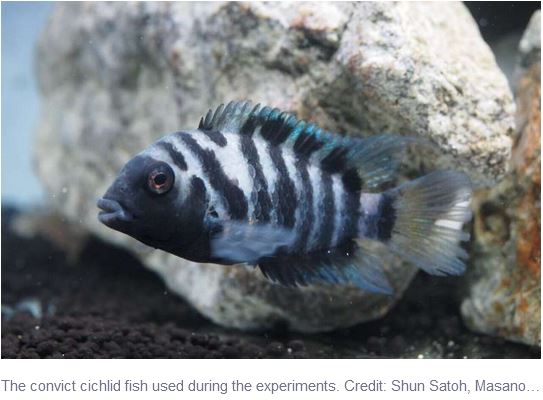The convict or zebra cichlid fish is a fish species from the family Cichlidae, native to Central America.
With a length of 3.9 in. to 4.7 in. (10-12 cm) and a weight of 1.2-1.3 oz (34-36 gm), the tiny zebra cichlid are popular aquarium fish and the subjects of numerous studies on fish behavior.
A recent study found that zebra cichlid display altruistic or pro-social behavior — that of sharing food with another cichlid.

Osaka City University writes in Phys.org, March 19, 2021, that a Japanese research group led by Shun Satoh and Masanori Kohda, professor of the Graduate School of Science, Osaka City University, discovered experimental evidence of altruistic tendencies in zebra cichlid fish through a series of pro-social choice tasks (PCT) in which male cichlid were given two choices:
- An anti-social option of receiving food for themselves alone; and
- A pro-social option of receiving food for themselves and their partner.
Methodology:
- Experiment One: An experimental male fish was placed in a tank (A), and another fish was presented to the male fish in another tank (B):
- When a female fish with whom the male fish had raised children was in tank B, the male fish actively made a pro-social choice and both fish received food.
- But when there was no one in tank B, the male fish preferred neither the pro-social nor anti-social option.
- Experiment Two: To understand how the social context affected the fish’s pro-social nature, the team changed the partners to rival males or females the experimental male fish had never met before:
- The male fish actively chose the anti-social option of not feeding the rival male, but
- Chose the prosocial option of feeding the unknown female as if it was their own breeding partner.
- Experiment Three:
- When the original female breeding-partner of the male fish was re-introduced to Tank B, the male fish made the anti-social choice of not feeding the female stranger fish.
- But when the original female fish was absent, the male fish made the pro-social choice of providing food for the unknown female.
Dr. Satoh said: “It can be said that the convict cichlid fish properly distinguish between paired females, unknown females, and rival males, and change their choices according to the situation.These PCT results mirror those from similar experiments with primates. However, this is the first time that caring and misbehaving behavior has been observed in fish. No one had ever expected such delicate and exquisite social behavior from such a small fish. Through more rigorous behavioral experiments, we hope to clarify whether these fish really have psychosociality and the motivation to produce it and also how the mind of this type of fish evolved to produce it.”
See also “Animal Altruism: Crow helps hedgehog cross road”.
~E

Amazing!
How very interesting. I would never have believed it.
Thank you Dr.E for this absolutely fascinating post and the research you performed to present it. Since God’s animals and fish and wild life of every kind, et al, are creatures without sin, I am so pleased to see that they are altruistic and loving, which makes sense since they do not sin. Wonderful! So even the little zebra fish knows how to love in such a superior norm.